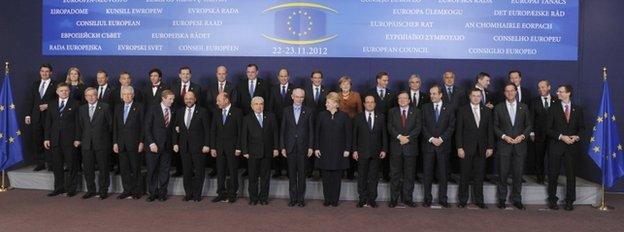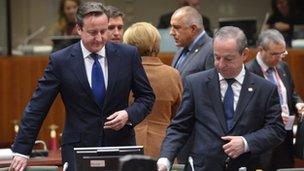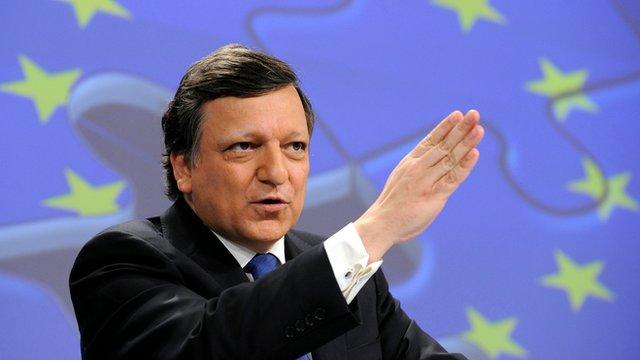The battle in Brussels
- Published
- comments

Europe's leaders predicted a bitter battle over the budget. And they were right.
They drifted away into the night in pessimistic mood.
"I think we're advancing a bit," said the German Chancellor Angela Merkel, "but I doubt that we will reach a deal."
Others suggested that a deal was not possible this time and that they would have to return in January and February.
The leaders will have the morning to mull over the latest budget proposal, hastily put together after nearly 12 hours of meetings.
During the day each of the 27 heads of government had been able to put their case to Europe's two most senior officials.
Someone described it as a "parade of differences".
In the latest proposal, the spending ceiling remains pretty much the same at 940bn euros (£759bn; $1.2tn).
Some money has been shifted to help the poorer regions and some more has been earmarked for farm subsidies. That provoked one official to call it "a step backwards".
Coming from a northern European country, he said the budget needed to reflect a more "modern agenda".
The French President Francois Hollande is on the defensive but battling to protect the Common Agricultural Policy.
Posturing
"It allows us to feed our people, to have food security, to have top quality food, to export food," he said.
"I am not just defending France - I am also showing solidarity with people throughout Europe, this is a European policy."
This revised proposal was an attempt to balance all the competing interests. The fault lines have become clearer. Most of those countries which do well out of EU grants have banded together to oppose any cuts.
The French, Italians and Spanish are fighting fiercely to protect their farmers.
On Thursday, David Cameron had been first in to see Europe's two top officials. They had been surprised when he told them how they could save several billion euros by attacking perks and salaries.

The British are being accused of intransigence
One official later described it as "theatre for the British morning papers". In the revised proposal there were no changes to administrative costs. Another pointed out that the pay rise for civil servants in the UK had gone up 0.9% in 2012 and that David Cameron was demanding a 10% cut for the so-called eurocrats.
Britain, in seeking a freeze on actual spending, has allies in Sweden and the Netherlands.
The interesting position is that of the Germans. Angela Merkel, as always, disguises her negotiating hand until the very last. Her view is that the "positions are quite far apart".
Her bottom line is that "everybody is going to have to compromise and be ready to compromise". That was seen as sending a message to the British.
Already there is some muttering about "British intransigence". David Cameron has made it clear there is no question of a cut to the rebate worth around £3bn a year.
A deal is still possible when the leaders reconvene later, but the mood was perhaps best summed up by the President of the European Parliament, Martin Schulz.
"I don't see," he said, "how a bridge can be built between all these different interests."
- Published21 November 2012

- Published24 September 2015